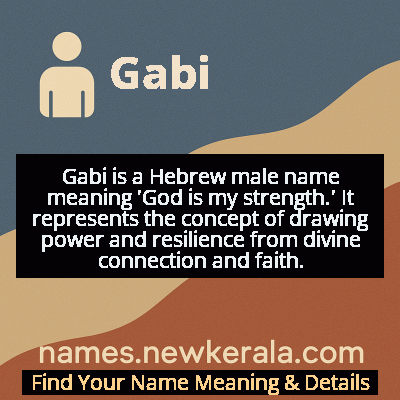Gabi Name Meaning & Details
Origin, Popularity, Numerology Analysis & Name Meaning of Gabi
Discover the origin, meaning, and cultural significance of the name GABI. Delve into its historical roots and explore the lasting impact it has had on communities and traditions.
Name
Gabi
Gender
Male
Origin
Hebrew
Lucky Number
1
Meaning of the Name - Gabi
Gabi is a Hebrew male name meaning 'God is my strength.' It represents the concept of drawing power and resilience from divine connection and faith.
Gabi - Complete Numerology Analysis
Your Numerology Number
Based on Pythagorean Numerology System
Ruling Planet
Sun
Positive Nature
Leaders, ambitious, highly driven, self-reliant, innovative.
Negative Traits
Overly aggressive, domineering, impatient, selfish.
Lucky Colours
Red, orange, gold.
Lucky Days
Sunday.
Lucky Stones
Ruby, garnet.
Harmony Numbers
2, 3, 9.
Best Suited Professions
Entrepreneurs, managers, engineers.
What People Like About You
Courage, determination, leadership.
Famous People Named Gabi
Gabi Ashkenazi
Military Commander and Diplomat
Former Chief of General Staff of the Israel Defense Forces and current Foreign Minister of Israel
Gabi Kanichowsky
Soccer Player
Israeli professional footballer who plays as a midfielder for Maccabi Tel Aviv and the Israel national team
Gabi Mudrik
Basketball Player
Former Israeli professional basketball player who played for Maccabi Tel Aviv and the Israeli national team
Gabi Gazit
Actor and Voice Artist
Prominent Israeli actor and voice actor known for dubbing international films and television shows into Hebrew
Name Variations & International Equivalents
Click on blue names to explore their detailed meanings. Gray names with will be available soon.
Cultural & Historical Significance
The shortened form Gabi maintains this spiritual connection while offering a more casual, approachable version of the formal name. Throughout Jewish and Christian communities, the name has been used for centuries, symbolizing divine protection and strength through faith. In modern Israeli culture, Gabi represents a connection to traditional roots while fitting contemporary naming preferences for shorter, more informal names. The name's enduring popularity across generations demonstrates its ability to bridge ancient spiritual traditions with modern cultural expressions.
Extended Personality Analysis
Individuals named Gabi are often perceived as strong-willed yet compassionate, embodying the 'strength' aspect of their name's meaning while maintaining approachability. They tend to be natural communicators and mediators, capable of expressing themselves clearly and understanding multiple perspectives. This combination of strength and empathy makes them effective leaders who can inspire confidence while remaining connected to those they lead. Gabi's are typically resilient in facing challenges, drawing on inner resources that align with the spiritual connotation of their name.
They often exhibit a balanced personality—assertive when necessary but never aggressive, principled yet flexible, and deeply loyal to their values and relationships. Many Gabi's develop a quiet confidence that doesn't need constant validation, making them stable presences in both personal and professional contexts. Their inherent strength often manifests as emotional resilience and the ability to support others during difficult times. While they can be determined and focused when pursuing goals, they typically avoid arrogance and remain grounded in their interactions with others.
Modern Usage & Popularity
In contemporary usage, Gabi remains particularly popular in Israel and Jewish communities worldwide, though it has gained some international recognition through cultural exchange and media representation. The name maintains its traditional Hebrew roots while fitting well with modern naming trends that favor shorter, more casual names. While historically masculine, Gabi has seen some crossover usage for females in certain European countries, though it predominantly remains a male name in Hebrew-speaking contexts. Its popularity has remained relatively stable rather than experiencing dramatic spikes or declines, indicating its enduring appeal as a name that balances tradition with modernity. The name works well in multicultural settings and is easily pronounceable across different languages, contributing to its continued usage among diaspora communities and its occasional adoption by non-Jewish parents attracted to its pleasant sound and meaningful origins.
Symbolic & Spiritual Meanings
Symbolically, Gabi represents the concept of divinely-inspired strength and protection. The name carries connotations of resilience that comes from spiritual faith rather than mere physical power, suggesting that true fortitude emerges from inner conviction and connection to higher principles. Metaphorically, Gabi suggests a bridge between the divine and human realms—much like the archangel Gabriel served as a messenger between God and humanity, individuals with this name often find themselves in roles that require mediation, communication, or bringing different perspectives together. The name also implies reliability and steadfastness, representing someone who can be depended upon in difficult times and who provides stability to others. In a broader sense, it embodies the balance between power and compassion, suggesting that the strongest individuals are those who use their strength to protect and uplift others rather than dominate them.

